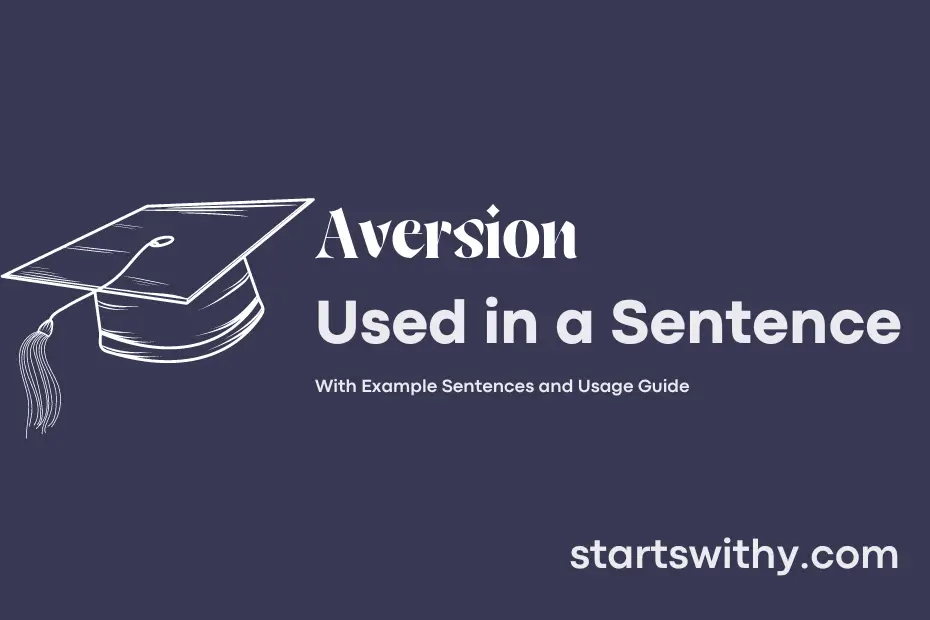Do you find yourself feeling a strong dislike or avoidance towards something specific? This feeling of intense reluctance or distaste is known as aversion. Whether it’s towards a certain food, activity, or situation, aversion encompasses a strong sense of opposition or resistance.
An aversion can be triggered by various factors such as past experiences, personal preferences, or even cultural influences. Understanding the root of your aversions can help in managing or overcoming them. Let’s delve deeper into the concept of aversion and explore ways to handle these strong feelings of dislike.
7 Examples Of Aversion Used In a Sentence For Kids
- I have an aversion to eating green vegetables.
- She has an aversion to loud noises.
- My brother has an aversion to spiders.
- The cat showed an aversion to taking a bath.
- The boy has an aversion to going to bed early.
- The dog has an aversion to taking medicine.
- The girl has an aversion to wearing shoes.
14 Sentences with Aversion Examples
- Aversion to early morning classes is common among college students.
- Many students have a strong aversion to group projects due to unequal distribution of work.
- Some students have an aversion to public speaking, which can affect their participation in class.
- There is a noticeable aversion towards studying for exams among some students.
- The cafeteria food has received a lot of criticism, leading to an aversion towards eating on campus.
- Students often express aversion towards attending lectures that are not relevant to their field of study.
- There is an aversion towards participating in extracurricular activities among some students due to academic pressures.
- The college library’s strict rules have caused an aversion among students, who prefer studying elsewhere.
- The lack of proper infrastructure in labs has created an aversion towards conducting experiments.
- Some students have developed an aversion to pursuing internships due to the competitive nature of placements.
- The professor’s teaching style has led to an aversion among students, affecting their learning experience.
- Many students have an aversion towards asking questions in class out of fear of sounding unintelligent.
- The frequent power outages in the dormitories have caused an aversion towards staying on campus.
- The lack of mental health support services has created an aversion towards seeking help for stress and anxiety among students.
How To Use Aversion in Sentences?
To aversion is to have a strong dislike or repulsion towards something. When using aversion in a sentence, you can follow these steps for clarity:
-
Identify the thing or concept you have a strong dislike for. For example: “I have an aversion to spicy food.”
-
Place the word aversion in the sentence where it fits naturally. For instance: “My aversion to spiders makes it difficult for me to enter the basement.”
-
Ensure the sentence structure is clear and coherent to convey your dislike effectively. Example: “She has a strong aversion to horror movies, so she always chooses comedies instead.”
-
You can also use aversion in a phrase to emphasize the intensity of your dislike. For example: “His extreme aversion to public speaking is well-known among his colleagues.”
-
Remember to use aversion when you want to express a strong aversion or dislike towards something. It is a powerful word that conveys a deep-seated feeling of repulsion or avoidance.
By following these steps and practicing using aversion in various contexts, you will become more comfortable incorporating it into your vocabulary.
Conclusion
In conclusion, aversion is a strong feeling of dislike or disgust towards something. This can be seen in sentences such as “He showed a clear aversion to public speaking” or “She has an aversion to spiders.” Aversion can manifest in different ways, from physical reactions to avoidance behaviors, and it can stem from past experiences, fears, or personal preferences. Understanding aversion is crucial in personal interactions and decision-making processes, as it can greatly influence our emotions and behaviors.
Recognizing and addressing aversions can lead to better communication, improved relationships, and more effective problem-solving. By acknowledging and respecting individuals’ aversions, we can create a more inclusive and understanding environment for all. It’s essential to approach aversions with empathy and sensitivity, as everyone may have different triggers or reasons for their dislikes.



